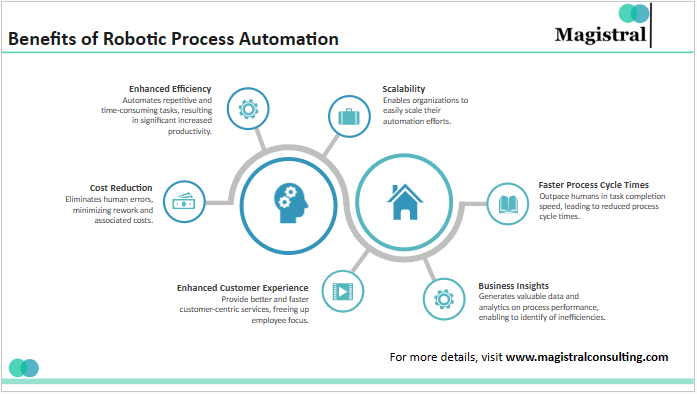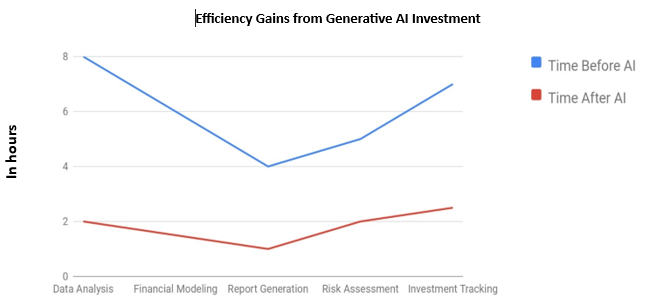Introduction to Robotic Process Automation
Robotic Process Automation (RPA) involves the utilization of software robots or “bots” to automate repetitive and rule-based tasks found in business processes. RPA technology imitates human actions and engages with digital systems to execute tasks like data entry, data extraction, form filling, report generation, and others. These software robots possess the ability to operate across various applications and systems by utilizing user interfaces to navigate and complete tasks just as a human user would.
The distinctive feature of RPA, as compared to traditional automation, is that it doesn’t require complex integration or modification of existing systems. Rather, it operates on the surface level, interacting with the user interface of applications to perform tasks. This aspect makes RPA highly adaptable and enables organizations to rapidly implement automation solutions without extensive IT development or infrastructure changes.
RPA bots can be programmed to follow predefined rules and instructions, and they can handle both structured and unstructured data by utilizing techniques like optical character recognition (OCR) and natural language processing (NLP). Furthermore, RPA technology can be bolstered with machine learning and artificial intelligence (AI) capabilities to handle more intricate tasks and make data-driven decisions.
In essence, Robotic Process Automation offers organizations the potential to enhance operational efficiency, reduce errors, improve scalability, and liberate human resources from mundane tasks, enabling them to concentrate on activities that provide greater value.
Types of Robotic Process Automation Robots
There are three primary categories of RPA robots commonly utilized in Robotic Process Automation (RPA):

Types of Robotic Process Automation Robots
Attended Robots
Also known as desktop robots or front-office robots, attended robots collaborate with human users. They operate on the same workstation as the user, working in real-time alongside them. Attended robots assist users by automating specific tasks, offering suggestions, and providing on-demand automation capabilities. Typically, these robots are triggered by user actions such as clicking a specific button or pressing a key combination.
Unattended Robots
Referred to as back-office robots or server robots, unattended robots function autonomously without human intervention. They can execute automation workflows in a virtual or physical environment without requiring user interaction. Unattended robots are scheduled to perform tasks at predefined times or triggered by specific events. They are well-suited for handling high-volume and repetitive processes and can operate on dedicated servers or virtual machines.
Hybrid Robots
Hybrid robots possess the combined capabilities of both attended and unattended robots. They can function in attended mode when human interaction is necessary and switch to the unattended mode for lights-out automation. This flexibility allows a single robot to adapt to the requirements of a given task or process, accommodating both human collaboration and autonomous operation.
The selection of robot type depends on factors such as the task’s nature, the level of human involvement required, and the organization’s automation objectives.
Benefits of Robotic Process Automation
Implementing Robotic Process Automation (RPA) provides organizations with numerous advantages. Here are some key benefits of RPA implementation:

Benefits of robotic process automation
Enhanced Efficiency
RPA saves a lot of time and improves productivity by automating repetitive and time-consuming business operations. Software robots have the ability to work continuously, increasing productivity while performing jobs more quickly.
Cost Reduction
Organizations can save money on labor costs by automating manual operations, which lessens their reliance on human resources. By removing human error, RPA reduces rework and related expenses.
Scalability
RPA enables organizations to easily scale their automation efforts. As work volume increases, additional software robots can be swiftly and efficiently deployed, without the need for extensive infrastructure changes or resource allocation.
Faster Process Cycle Times
RPA robots outpace humans in task completion speed, leading to reduced process cycle times. This increased velocity helps organizations meet deadlines, improve response times, and achieve operational agility.
Business Insights
RPA generates valuable data and analytics on process performance, enabling organizations to identify bottlenecks, inefficiencies, and areas for improvement. Data-driven decision-making and process optimization become feasible through these insights.
Enhanced Customer Experience
Enhanced Customer Experience: RPA frees up professionals to concentrate on customer-focused activities by automating repetitive chores. This makes it possible for businesses to interact with customers more quickly and better, which increases client loyalty and happiness.
Overall, robotic process automation provides businesses with a multitude of advantages, such as greater productivity, reduced expenses, accuracy, scalability, better customer experience, quicker process cycles, integration possibilities, appropriateness, business insights, and happier workers.
Limitations of Robotic Process Automation
Although Robotic Process Automation (RPA) offers numerous advantages, its implementation can also present various challenges and limitations for organizations:
Process Complexity
RPA is most suitable for automating repetitive tasks with clear rules. Processes involving complex decision-making, unstructured data, or requiring human judgment may not be well-suited for RPA alone. In such cases, a combination of RPA and other technologies, such as artificial intelligence or human intervention, may be necessary.
System Compatibility
RPA interacts with existing systems through user interfaces. If the target systems undergo frequent updates or have non-standard interfaces, compatibility issues may arise for RPA robots. Changes in UI elements, system upgrades, or security measures can disrupt automation workflows and necessitate modifications to the RPA implementation.
Change Management
Implementing RPA into practice involves organizational and process modifications. Adoption of RPA might be hampered by employee apathy and resistance to change. Employers must be included in the automation process, trained, and communicated to in order for organizations to effectively manage change.
Maintenance and Support
RPA requires ongoing maintenance and support to ensure smooth automation workflows. Managing updates, resolving issues, and monitoring robot performance can be time-consuming and resource intensive.
Despite these challenges and limitations, organizations can mitigate risks and maximize RPA benefits through proper planning, stakeholder engagement, continuous monitoring, and a strategic approach to automation implementation.
Magistral’s Services on Robotic Process Automation
Magistral Consulting Services offers comprehensive solutions and expertise in Robotic Process Automation (RPA) to help organizations harness the full potential of automation. Our RPA consulting services include:
RPA Strategy and Roadmap
By working directly with our clients, we fully comprehend their unique business objectives and challenges. Next, a tailored RPA strategy and roadmap outlining the best automation technique is created by our team of experts.
Process Assessment and Feasibility Analysis
Our dedicated team conducts a comprehensive assessment of existing processes to identify areas suitable for automation. We evaluate the feasibility of automation, considering factors such as process complexity, data availability, and potential benefits.
RPA Implementation and Deployment
With our extensive experience across diverse industries and domains, we possess the expertise to implement RPA solutions effectively. We handle end-to-end deployment, including configuration, testing, and the rollout of software robots.
RPA Support and Maintenance
Our services extend beyond implementation to offer ongoing support and maintenance. We proactively monitor automation workflows, promptly resolve issues, and provide timely enhancements and updates to adapt to evolving business needs.
Intelligent Automation and Advanced RPA
Leveraging cutting-edge technologies such as artificial intelligence (AI) and machine learning (ML), we enhance RPA capabilities through intelligent automation.
By contracting with Magistral Consulting Services, you can be confident that you are going to have access to experienced RPA specialists with a proven track record of successful machine learning deployments, in-depth market knowledge, and technical expertise. Our goal is to effectively use robotic process automation to improve productivity, efficiency, and business transformation.
About Magistral Consulting
Magistral Consulting has helped multiple funds and companies in outsourcing operations activities. It has service offerings for Private Equity, Venture Capital, Family Offices, Investment Banks, Asset Managers, Hedge Funds, Financial Consultants, Real Estate, REITs, RE funds, Corporates, and Portfolio companies. Its functional expertise is around Deal origination, Deal Execution, Due Diligence, Financial Modelling, Portfolio Management, and Equity Research
For setting up an appointment with a Magistral representative visit www.magistralconsulting.com/contact
About the Author
The article is Authored by the Marketing Department of Magistral Consulting. For any business inquiries, you could reach out to prabhash.choudhary@magistralconsulting.com




